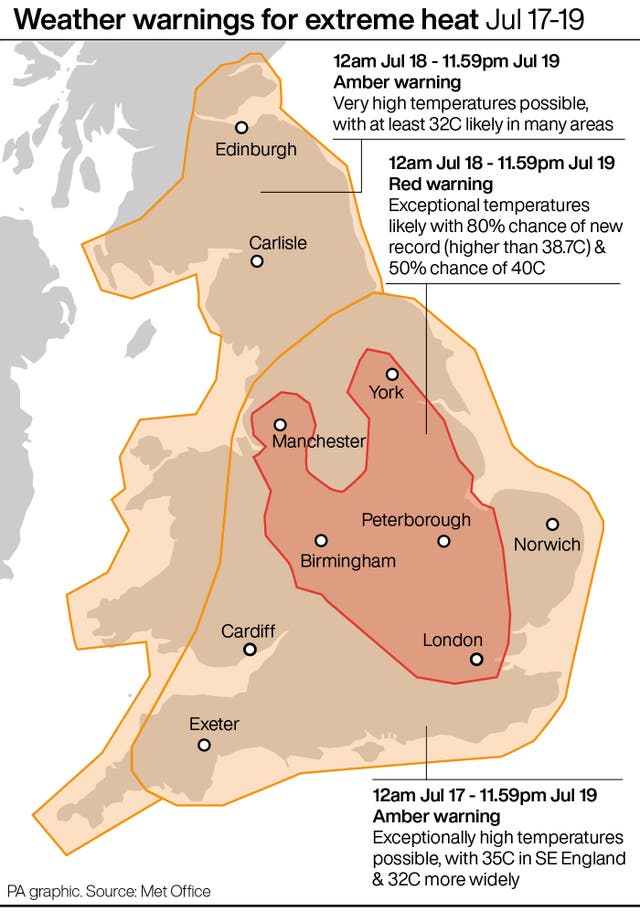Train companies urge people not to travel during heatwave
More than a dozen train companies are urging Britons not to travel early next week as the UK’s first red extreme heat warning comes into force.
A total of 21 operators – ranging from Transport for Wales and Gatwick Express to the Transpennine Express and Southern – said they will be running a slower service on Monday and Tuesday after National Rail implemented speed restrictions across its network.
Speed restrictions are used by train companies during periods of hot weather to avoid any damage being made to the tracks and to prevent rails from buckling.
Cancellations are also in place as temperatures are predicted to soar to highs of 38C and 40C in some parts of England.
Amber and red extreme heat warnings have been implemented across the nation for the duration.
Those who have to travel are being encouraged to check their journeys on the National Rail website before setting off and taking water with them to stay hydrated.
Refunds are being offered to those who do not travel but have already purchased tickets.
LNER has said no trains are running from south of York and south of Leeds to London Kings Cross on Tuesday.
Chief operating officer of Transport for London, Andy Lord, said London’s rail network would also be running a reduced service on Monday and Tuesday.
He told LBC: “We’re advising all our customers to only travel if their journey is essential, to make sure that they stay hydrated and carry water with them if they do have to travel.
“Check before they travel because journey times will be extended.
“We will have reduced services across the TFL network because of the safety restrictions we need to put in place due to the heat.”
The AA has meanwhile warned of roads melting and tyres bursting early next week during the heatwave.
Some local authorities have sent out the gritters to put sand on roads to try to prevent the road surface from melting, the association said.
Heatwave" data-title="WEATHER Heatwave" data-copyright-holder="PA Graphics" data-copyright-notice="PA Graphics/Press Association Images" data-credit="" data-usage-terms="" srcset="https://image.assets.pressassociation.io/v2/image/production/541e54b8c9ce3cbb4137a6742a0c615aY29udGVudHNlYXJjaGFwaSwxNjU4MTU4MjQ3/2.67926346.jpg?w=224 224w, https://image.assets.pressassociation.io/v2/image/production/541e54b8c9ce3cbb4137a6742a0c615aY29udGVudHNlYXJjaGFwaSwxNjU4MTU4MjQ3/2.67926346.jpg?w=449 449w, https://image.assets.pressassociation.io/v2/image/production/541e54b8c9ce3cbb4137a6742a0c615aY29udGVudHNlYXJjaGFwaSwxNjU4MTU4MjQ3/2.67926346.jpg?w=899 899w" sizes="(max-width: 767px) 89vw, (max-width: 1000px) 54vw, (max-width: 1071px) 543px, 580px">
The AA and North West Ambulance Service have been advising that there is a greater danger of tyre blow-outs in extreme temperatures and have suggested drivers check their tyre pressures – when the tyre is cold – before setting off on their journeys.
They have also urged people to drive earlier in the day time to prevent engines from overheating.
Edmund King, AA president, said: “The extreme temperatures could be dangerous if you breakdown or get stuck in congestion. Ensure you have enough fuel or electric charge to keep your air-conditioning running. The heatwave could cause considerable problems for many older vehicles without air-conditioning or recent servicing, with both the car and occupants over-heating. Driving outside the hottest part of the day is advisable.
“Carry plenty of water – at least one litre per person travelling. Keeping yourself and other occupants hydrated can help lower body temperatures in hot weather. If the worst should happen, you can keep yourself and those with you topped up with cool water while waiting for help to arrive.”
The best videos delivered daily
Watch the stories that matter, right from your inbox

 Heatwave" data-title="WEATHER Heatwave" data-copyright-holder="
Heatwave" data-title="WEATHER Heatwave" data-copyright-holder="




